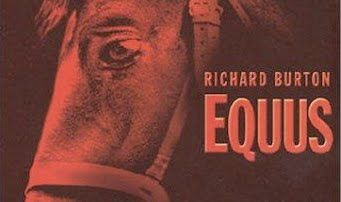Equus lands itself in as one of the most sexually suggestive films I've ever witnessed. It would likely also launch itself onto the list of most perversely dark (as opposed to innocently dark... think "Watership Down").
Add this one to the list as well: Equus not only contains moments that undercut iconic images of the Son of God as classically depicted in art, but also continually alludes to the polytheistic universe. In part this is the whole mantra of the film; 'what is it like to be a pagan stuck in an unbelieving world?' Even the title, Equus, plays up this conflict, which apparently refers to the god of horses, hence where we get the word equestrian.
The film has the following elements: masochism, bestiality (in idea if not in form), infanticide (in a dream), polytheism, lots of full-frontal nudity (male and female), and the gauging out of eyeballs. It's quite the film.
Yet one thing I have failed yet to mention. The whole narrative is told to us by a psychologist. He is our grounded protagonist. We believe he is in control, and will help us, the unwitting audience, traverse these murky themes. This is where Shaffer reveals his Amadeus roots... for our great observer of human nature, our dear psychologist, loses his grounding as the story uncoils.
Our psychologist, Dr. Dysart, played by an aging Richard Burton, is trying to help a young boy, overcome his obsession with horses. This obsession is both sexual and totalitarian. The boy has blended his understanding of the Christian God with the image of the horse. The god-Equus, watches him always, demands his loyalty, and cannot be hidden from. Do not fear! Dr. Dysart is a skilled practitioner at his trade and he will heal the boy. The boy will, by story's end, become normal.
Normal.
Our psychologist arrives at this conclusion: in the boy's abnormal obsession, he was a part of something far beyond the world of the normal. He felt things that the good doctor had never felt. The boy experienced existence on a plane of reality unknown to mere man. And the doc broke this in the boy.
This is a Fantastic Idea! YES! I endorse such notions.
If there is nothing more than the normal world, than it is far greater to be crazy than to be sane. This is Dr. Dysart's great lamentation. This is the Gospel. This is truth.
The words of Paul, in his 1st letter to the Corinthians, Verses 13-19, Chapter 15
and if Christ has not been raised, then our preaching is vain, your faith also is vain.
Moreover we are even found to be false witnesses of God, because we testified against God that He raised Christ, whom He did not raise, if in fact the dead are not raised.
For if the dead are not raised, not even Christ has been raised;
and if Christ has not been raised, your faith is worthless; you are still in your sins.
Then those also who have fallen asleep in Christ have perished.
If we have hoped in Christ in this life only, we are of all men most to be pitied."


I haven't seen the movie, but read the play a long time ago. The themes and images in the play have long stayed with me....
ReplyDelete